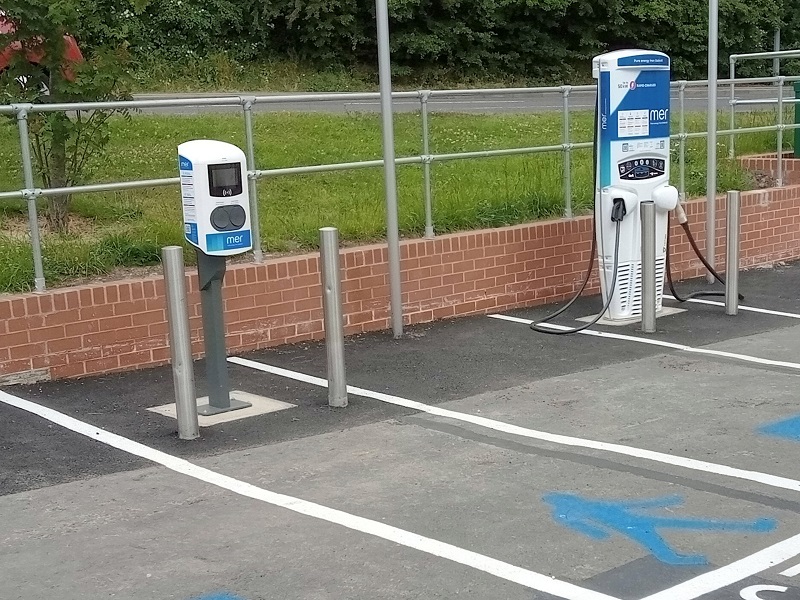 As the climate crisis continues to highlight the necessity of changing the way we live, work, travel and behave, the UK is on a journey towards creating and sustaining a low-carbon, low-emission transportation system. The move away from petrol and diesel vehicles and towards electric vehicles (EVs) is a fundamental transition for enabling this system. The EV market is already growing significantly; with over 810,000 fully electric cars on UK roads at the end of June 2023, more and more drivers are choosing to make the switch to EVs. Ahead of the ban of new petrol and diesel cars and vans in 2030, this trend is set to continue.
As the climate crisis continues to highlight the necessity of changing the way we live, work, travel and behave, the UK is on a journey towards creating and sustaining a low-carbon, low-emission transportation system. The move away from petrol and diesel vehicles and towards electric vehicles (EVs) is a fundamental transition for enabling this system. The EV market is already growing significantly; with over 810,000 fully electric cars on UK roads at the end of June 2023, more and more drivers are choosing to make the switch to EVs. Ahead of the ban of new petrol and diesel cars and vans in 2030, this trend is set to continue.
However, if the UK is to achieve a full transition to electric mobility in the coming decades, we need a strong, comprehensive, reliable and future-fit EV charging network that makes EV driving as easy and accessible as driving an internal combustion engine (ICE) vehicle.
Facilitating EV uptake with charging infrastructure
The current state of the UK’s charging infrastructure is one of the most pressing barriers to EV uptake. Whilst our charging network is expanding – there were 44,408 EV charge points across the UK at the end of June – a rapid build-out of charging infrastructure still remains integral. Charging an EV needs to be as simple as refuelling an ICE vehicle in order to encourage drivers to step away from the petrol/diesel market. But whilst pockets of the UK remain barren of charge points, public confidence in making the switch to electric mobility could decline.
This is especially the case for those without off-street parking and/or access to a home charger. Only 78% of homeowners have access to off-street parking; those without are dependent on the public charging network to charge their vehicles.
The role of local authorities
The Government has set a target of 300,000 charge points by 2030. The public sector has a vital role in encouraging EV uptake through working with charge point operators to install EV charging infrastructure in their local areas.
By supporting the achievement of this target, public sector bodies can help incentivise residents and visitors to switch to an EV. This has unparalleled benefits for communities and local areas.
A more environmentally friendly transport system means cleaner air and improved local public health
Transport is the UK’s largest emitting sector for greenhouse gases, accounting for 27% of the UK’s annual carbon emissions. Though the carbon footprint of an ICE vehicle is highly detrimental to the health of our planet and our people, EVs have a significantly lower environmental impact, and can therefore reduce our individual footprints each time we travel on the road
As of the network of charge points grows and the uptake of EVs subsequently increases, we will see lower pollution levels and cleaner air, which will contribute to improving public health and lowering our environmental impact when we travel.
Support for local authorities in turning EV charging strategies into reality
Financial support has been made available for local authorities as they plan for and roll out EV charging infrastructure. Schemes such as the On-Street Residential Chargepoint Scheme, Local EV Infrastructure (LEVI) Fund, the Workplace Charging Scheme and the Rapid Charging Fund, and public framework agreements including Kent County Services National Framework and the Crown Commercial Service’s Vehicle Charging Infrastructure Solutions Framework, are helping councils procure, finance and install EV charging infrastructure.
EV charging for Local Authorities with Mer
Mer is a European EV charging company, backed by Statkraft, Europe’s largest renewable energy generator. By bringing together our extensive expertise in renewables and electric mobility, Mer is on a mission to make EV charging simple, sustainable, and accessible to everyone.
We work with over 50 public sector bodies to bring scalable EV charging to hospitals, towns, cities, county councils and boroughs across the UK. With part to fully funded EV charging solutions available through public framework agreements, our focus on the customer experience, and quality over quantity ethos, Mer can provide future-fit, reliable EV charging to help support the transition to EVs in council areas.
We offer and promote the use of zero carbon, 100% renewable energy to our local authority customers.
Case Study: Durham County Council
In its Climate Change Strategy and Emergency Response Plan 2022-24, Durham County Council notes that transport in County Durham accounted for 34% of the county’s total carbon footprint in 2019 (excluding motorway traffic and trains on the East Coast Mainline). Emphasised in the plan is the importance of low carbon vehicles in reducing the County’s carbon footprint from transport.
In 2019, less than 50% of the Council’s EV charging infrastructure was working. As many rural communities were without charge points, residents were left without access to charging infrastructure in reasonable proximity to their homes. 40% of residents live in terraced houses with no access to off-street parking in the county, highlighting the need for a strong public charging network.
With funding from Innovate UK for the Scaling on Street Charging Infrastructure (SOSCI) project, Mer helped the Council bring EV charge points to 67 locations across the County, so that underserved communities could access reliable EV charging.
Durham County Council was awarded the 2022 Best EV Charging Project award from the Municipality Journal.
Find out more about our work with Durham County Council and other local authorities in our Best Practise Guide.
Start Your EV Charging Journey
The key to EV adoption is EV charging infrastructure. Join us on our mission to make electric mobility the new normal.
Find out more about how Mer can support local authorities and public sector bodies with the planning, roll-out and maintenance of EV charging infrastructure in our Best Practise Guide.
Website: uk.mer.eco
Email: info.uk@mer.eco








Recent Comments